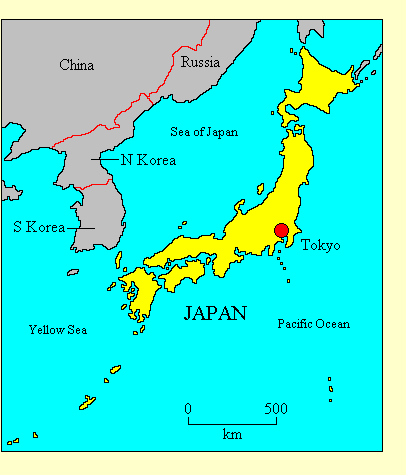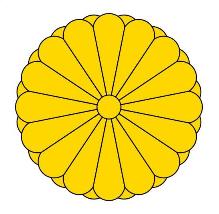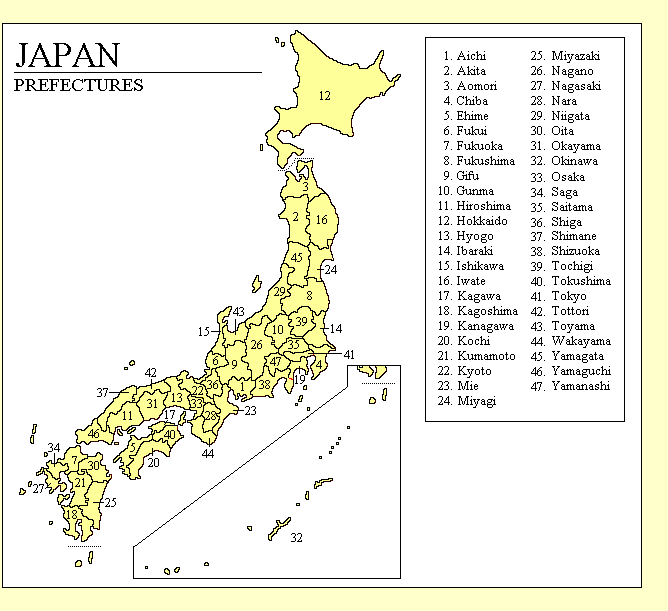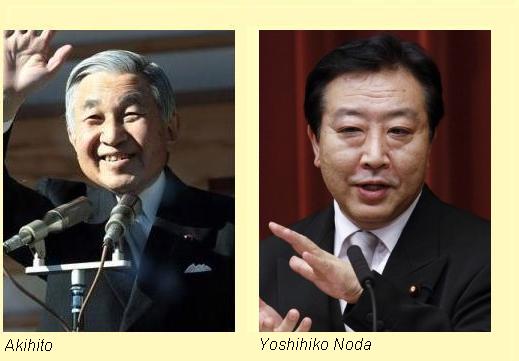

JAPAN
• Official name: Nihon (Japan)
• Location: North Asia
• International organisations: Asia-Pacific Economic Co-operation Forum, Group of Eight, Group of Twenty,
Organisation for Economic Co-operation and Development, United Nations, World Trade Organisation
• Borders: None
• Coastline: Sea of Japan, North Pacific Ocean
• Land area: 377,835 Km2
• Population: 127,600,000
• Annual GDP (PPP) per capita: US$32,600 (2009 CIA estimate). World ranking: 29
• Ethnicity: Almost the entire population is of Japanese stock. There are small Korean and Chinese
minorities.
• Languages: Japanese is the official language and is universally understood. Korean is the only
minority language of any significance.
• Religion: Most Japanese observe both Shinto and Buddhist rituals. There is a small Christian minority.
• Form of government: Constitutional monarchy and parliamentary democracy. Japan is divided into 47
prefectures for administrative purposes.
• Capital: Tokyo
• Constitution: The
Constitution of Japan came into effect on 3 May 1947
• Head of state: Emperor Akihito, succeeded to the throne on 7 January 1989. In
Japan he is usually referred to by the title Heisei-Tenno (the "Achieving Peace" Emperor).
• Head of government: The Prime Minister, appointed by the Emperor, usually the leader of the largest party in the legislature and accountable to it.
• Legislature: Japan has a bicameral legislature, the Kokkai (Parliament, known
in the West for some reason as the Diet). It consists of the House of Representatives (Shugi-in), which has 480 members, elected for four-year terms. Of these 180 are elected from 11 multi-member constituencies by
proportional representation, and 300 are elected from single-member constituencies.
The House of Councillors (Sangi-in) has 247 members. Of these 73 are elected from the 47 prefectural districts and 48 are elected from a nationwide list by proportional representation.

• Electoral authority: Japanese elections are conducted by the Central Election Management Council, a body which does not appear to have a website.
• Freedom House 2011 rating: Political Rights 1, Civil Liberties 2
• Transparency International Corruption Index: 78% (17 of 178 countries rated)
• Reporters Without Borders Press Freedom 2010 Index: 97.5% (11 of 178 countries rated)
• Heritage Foundation Economic Freedom 2010 Index: 72.8% (20 of 179 countries rated)
Political history
The Japanese monarchy dates back many centuries, but until 1868 political power was held by a
dynasty of warlords, the Tokogawa Shoguns, who dominated successive emperors. In 1868 the Emperor
Mitsuhito (Meiji-Tenno) reasserted imperial power as part of Japan's response to the challenge of the
west. European institutions, including a parliament and a prime minister, were introduced in 1885.
Unfortunately the European model which Japan chose to emulate was Imperial Germany, and this reinforced
the conservative traditions of Japan and made genuine democracy impossible.
During the reign of Hirohito (Showa-Tenno) from 1926, the military and extreme conservatives
tightened their grip, leading to the establishment of an outright authoritarian regime, which invaded
China in 1931 and attacked the United States and Britain in 1941.
Japan's defeat in 1945 led to American occupation led by General Douglas MacArthur, and the
adoption of a liberal constitution largely written by the Americans. The Parliament was elected by
universal suffrage and women were emancipated. The power of the miliary was broken. But the Cold War
and the presence of a strong Communist Party led to the formation of a single conservative party,
the Liberal Democratic Party,
which dominated Japanese politics for 55 years from 1954.

Through the 1950s and '60s successive LDP governments presided over Japan's rapid postwar
growth into an economic superpower, but from the '70s onwards the LDP became increasingly complacent,
corrupt and ineffective. It was kept in office by the weakness of its opponents, the
Social Democratic Party and the
Japan Communist Party, old-fashioned marxist parties which
offered no useful alternative to LDP rule. The Clean Government Party opposes corruption
but is itself linked to unsavoury secret societies and became an ally of the LDP, the main source
of corruption.
Splits in the LDP led to a brief loss of office to an
opposition coalition in 1993-94, but the LDP soon reasserted itself. Since about 1990 Japan has been mired in recession and a
crisis of institutions,
but the corruption and cronyism fostered by LDP rule obstructed necessary reforms. Junichiro
Koizumi came to power in April 2001 pledged to reform both the LDP and Japan, but he was largely
frustrated by conservatives in his own party. Following his retirement in 2006 the LDP declined under
three successive weak prime ministers.
The Democratic Party of Japan (DPJ) was founded in 1998 through the merger
of four smaller opposition parties, and at the 2003 elections it succeeded in establishing itself as
the dominant opposition party, giving Japan a clear two-party system and a viable alternative
government for the first time. The DPJ's first leader, Ichiro Ozawa, was regarded as tainted by his LDP
past, and the party was heavily beaten by the LDP at the 2005 elections. Following Ozawa's replacement by
Yukio Hatoyama in May 2009, the party surged ahead as the electorate tired of LDP misrule. At the August 2009
elections the DPJ won a massive victory, opening a new era in Japanese politics. Hatoyama proved an inept Prime
Minister and resigned in June 2010, and was succeeded by Naoto Kan. At upper house elections in July 2010, the
LDP staged a strong recovery. In September 2011, following the familiar Japanese pattern, Kan resigned and was
succeeded by Yoshihiko Noda.
Freedom House's 2011
report on Japan
says: "Japan is an electoral democracy... Significant reform efforts have focused on battling corruption stemming from the
iron triangle system, mostly by loosening ties between the government and big business...
Japan's press is private and independent, but the presence of press clubs, or kisha kurabu, even under the more liberal DPJ,
continues to be an obstacle to press freedom. Press clubs ensure homogeneity of news coverage by fostering close relationships
between the major media and bureaucrats and politicians... The constitution guarantees freedoms of assembly and association. The
political culture in Japan is strong, and there are active civic, human rights, social welfare, and environmental groups...
Japan's judiciary is independent. There are several levels of courts, and suspects are generally given fair public trials by an
impartial tribunal (there are no juries) within three months of being detained. The National Police Agency is under civilian
control and is highly disciplined, though reports of human rights abuses committed by police persist."
Updated November 2011
|

